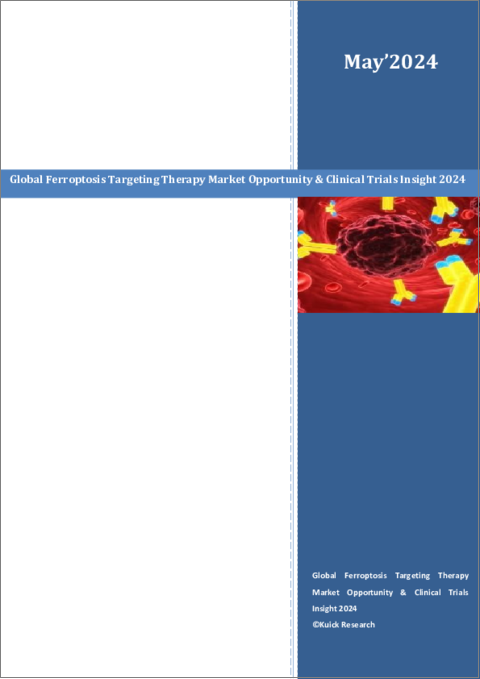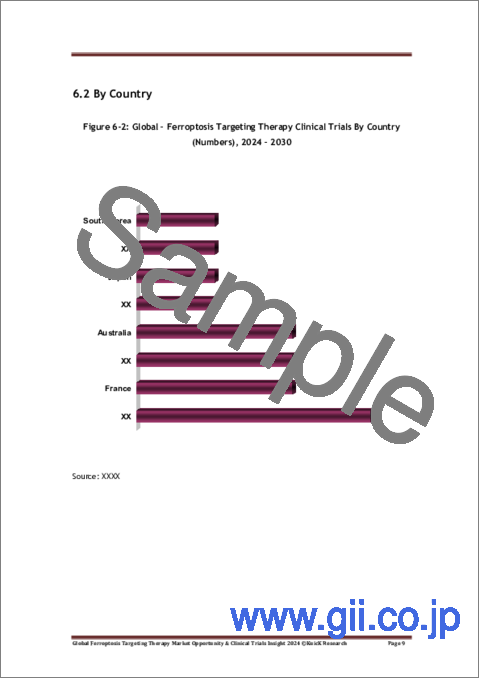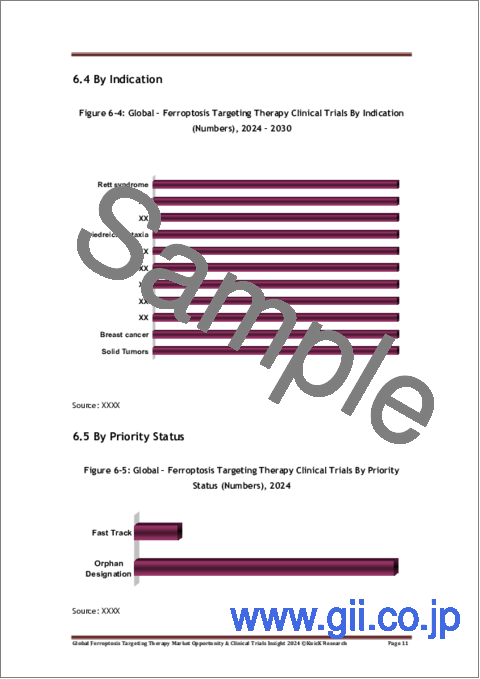|
|
市場調査レポート
商品コード
1486367
フェロトーシス標的療法の世界市場:市場機会と臨床試験に関する洞察(2024年)Global Ferroptosis Targeting Therapy Market Opportunity & Clinical Trials Insight 2024 |
||||||
|
|||||||
| フェロトーシス標的療法の世界市場:市場機会と臨床試験に関する洞察(2024年) |
|
出版日: 2024年05月01日
発行: KuicK Research
ページ情報: 英文 100 Pages
納期: 即日から翌営業日
|
全表示
- 概要
- 図表
- 目次
これまで、フェロトーシス標的療法の世界の分野は、この革新的な治療法の変革の可能性に加え、研究開発の顕著な進展に後押しされ、前衛的な成長を遂げてきました。そのため、MitoImmune TherapeuticsやPTC Therapeuticsなど、世界中の製薬会社やバイオテクノロジー企業が参入しています。
それに加えて、いくつかの製薬会社やベンチャー企業も、フェロトーシスを標的とした治療法の研究開発を進めています。例えば、米国を拠点とするKojin Therapeuticsは2020年に設立されました。同社は、がん、心血管、免疫、変性疾患を患う多くの患者の治療のためのファースト・イン・クラスの競合薬を開発する意図で、フェロトーシス生物学に加えて細胞状態における革命的な発見を活用しています。
さらに、Prothegenも2021年に立ち上げられるバイオテクノロジー新興企業です。フェロトーシスの概念を発見したフェロトーシスの世界的リーダーによって設立されたProthegenは、フェロトーシスの領域が年々拡大していることを示すように、絶妙な精度で細胞死を制御する画期的なフェロトーシス療法を提供することを目指しています。
当レポートは、世界のフェロトーシス標的療法市場について調査し、市場の概要とともに、薬剤動向、臨床試験動向、地域別動向、および市場に参入する企業の競合情勢などを提供しています。
目次
第1章 フェロトーシス標的療法の合併症の解明
- フェロトーシス標的療法の概要
- フェロトーシス標的療法の経緯と開発
第2章 フェロトーシス標的療法の臨床的必要性
第3章 診断および予後バイオマーカーとしてのフェロトーシスの二重の役割
第4章 フェロトーシス管理の画期的な戦略
- 小分子
- 医薬品の再利用
- 光線力学療法
- 細胞外小胞
第5章 適応症別のフェロトーシス標的療法:臨床動向とイノベーション
- がん
- 自己免疫疾患および炎症性疾患
- ウイルス感染
- 神経系障害
- 心臓疾患
第6章 全身性フェロトーシス標的療法の臨床試験の概要
- 相別
- 国別
- 企業別
- 適応症別
- 優先度別
第7章 全身性フェロトーシス標的療法の臨床試験の洞察
- 調査
- 前臨床
- 第I相
- 第II相
- 第III相
第8章 世界のフェロトーシス標的療法の現在の市場動向と開発
- 現在の市場の概略
- 今後の市場予測
第9章 フェロトーシス標的療法の動向分析:地域別
- 米国
- 中国
- 欧州
- 韓国
第10章 FDAとEMAの指定を受けたフェロトーシス候補
第11章 フェロトーシス標的療法の併用戦略
- 従来の治療法との併用
- 光線力学療法と磁場との併用
第12章 高度なフェロトーシス標的療法の開発に使用されるプラットフォーム
第13章 フェロトーシス標的療法の世界市場力学
- 市場の促進要因
- 市場の課題
第14章 競合情勢
- Kojin Therapeutics
- MitoImmune Therapeutics
- Prothegen
- PTC Therapeutics
- Sumitomo
- Tharimmune
List of Figures
- Figure 1-1: Role of Ferroptosis in Various Indications
- Figure 1-2: Progression of Cell Death
- Figure 2-1: Need of Ferroptosis Therapy
- Figure 3-1: Ferroptosis Related Protein as Diagnostic & Prognostic Marker
- Figure 4-1: Therapeutic Modality for Ferroptosis
- Figure 5-1: Plant Products Used to Induce Ferroptosis in Cancer Treatment
- Figure 5-2: CNSI-Fe (II) Phase I Study - Initiation & Completion Year
- Figure 5-3: N6F11 (Ferroptosis Inducer) - Mode of Action
- Figure 5-4: MIT-001 Phase II (NCT05493800) Study - Initiation & Completion Year
- Figure 5-5: MIT-001 - Preclinical Stage for Viral Infections
- Figure 5-6: Vatiquinone (NCT05515536) Phase III Study - Initiation & Completion Year
- Figure 5-7: Utreloxastat Phase II Study - Initiation & Completion Year
- Figure 6-1: Global - Ferroptosis Targeting Therapy Clinical Trials By Phase (Numbers), 2024
- Figure 6-2: Global - Ferroptosis Targeting Therapy Clinical Trials By Country (Numbers), 2024 - 2030
- Figure 6-3: Global - Ferroptosis Targeting Therapy Clinical Trials By Company (Numbers), 2024
- Figure 6-4: Global - Ferroptosis Targeting Therapy Clinical Trials By Indication (Numbers), 2024 - 2030
- Figure 6-5: Global - Ferroptosis Targeting Therapy Clinical Trials By Priority Status (Numbers), 2024
- Figure 8-1: Key Players - Ferroptosis
- Figure 8-2: Rudolf Virchow Centre & Julius-Maximilians-Universitat Wurzburg Professors received Grant by European Research Council
- Figure 8-3: Ferroptosis - Future Market
- Figure 9-1: Vatiquinone Phase III (NCT05218655) Study - Initiation & Completion Year
- Figure 9-2: Utreloxastat & Vatiquinone Current Development Status
- Figure 9-3: Kojin Therapeutics Investors
- Figure 9-4: Roche Accelerator, China - Included Keen Therapeutics to Advance Ferroptosis Therapies
- Figure 9-5: MIT-001 Phase II (NCT04651634) Study - Initiation & Completion Year
- Figure 11-1: Ferroptosis Combinations with Other Therapies
- Figure 12-1: Kojin Therapeutics - Ferroptosis Platform
- Figure 13-1: Ferroptosis - Market Drivers
- Figure 13-2: Ferroptosis - Market Challenges
List of Tables
- Table 4-1: Therapeutic Compounds Inducing/Inhibiting Ferroptosis
- Table 5-1: Reversing Therapies Resistance by Ferroptosis Inducing Compounds for Cancer
- Table 5-2: Role of Ferroptosis in Autoimmune & Inflammatory Disease
- Table 5-3: Anti-Ferroptosis Therapeutic Options for Autoimmune & Inflammatory Disease
- Table 5-4: Ferroptosis Effector & its Mechanism in Nervous System Disorders
- Table 5-5: Role of Ferroptosis in Cardiovascular Diseases
- Table 10-1: Ferroptosis Targeting Therapies Granted FDA & EMA Designations
Global Ferroptosis Targeting Therapy Market Opportunity and Clinical Trials Insight 2024 Report Highlights:
- Global and Regional Market Opportunity Analysis
- Clinical Trials Insight On Key Therapies In Trials: > 10 Therapies
- Ferroptosis Targeting Therapy Clinical Trials Insight By Company, Country, Indication and Phase
- Ferroptosis Targeting Therapy Clinical Trends and Innovations Outlook By Indications
- Key Therapies Clinical Study Initiation and Completion Year Insight
- Ferroptosis Candidates Granted FDA and EMA Designations: Orphan, Fast Track
The panorama of scientific targeting therapy landscape is countersigning a transmogrification swing as headways in therapeutic research in conjugation with technological advancement pave the way for more precise and tailored treatment approaches. Midst the notable developments is the growing recognition of the prerequisite for ferroptosis targeted therapy, a recently discovered form of regulated cell death, has garnered historic consideration in the field of cancer research as well as drug development. Presently, no ferroptosis targeting therapies have entered into the commercial global market, thereby, representing an opportunity for pharma companies to advance the realm of ferroptosis targeted therapy.
Hitherto, the global sector of ferroptosis targeted therapy has acknowledged an avant-garde growth, fueled by the noteworthy progression in research and development, in addition to the transformative potential of this innovative treatment modality. On that account, several pharma in addition to biotech companies across the globe, comprising MitoImmune Therapeutics, and PTC Therapeutics.
Coupled with that, several pharma companies as well as ventures are additionally shepherding superfluous research and development for ferroptosis targeting therapies. For instance, Kojin Therapeutics, based in the US, was founded in 2020. The company is leveraging revolutionary findings in cell-state in addition to ferroptosis biology with the intention to develop first-in-class contenders for the treatment of numerous patients suffering with cancer, and cardiovascular, immunologic, and degenerative diseases.
Moreover, Prothegen is another biotech start-up business that is launched in 2021. Founded by world leaders in ferroptosis who discovered the concept of ferroptosis, Prothegen aims to deliver ground-breaking ferroptosis therapies to control cell death with exquisite accuracy, indicating that the domain of ferroptosis is augmenting year by year.
Owing to positive outcomes observed in preclinical as well as translational studies led to initiation of clinical trials. For instance, vatiquinone (PTC743), a small molecule, first-in-class selective inhibitor of 15 lipoxygenase (15-LO), is currently in open-label, phase III safety study (NCT05218655) to assess the safety of vatiquinone in participants with inherited mitochondrial disease. It is an interventional study which has an estimated enrollment of 100 participants. The clinical research was begun in June 2022 and is expected to be complete by March 2025.
Data from gathering evidences suggests the participation of ferroptosis in various pathological conditions apart from cancer, for example autoimmune disorders, inflammation, neurodegenerative diseases, ischemic injuries, kidney illness and age related disorders, has expanded the potential applications of ferroptosis targeting therapy. For that reason, healthcare professionals are scrutinizing the therapeutic potential of targeting ferroptosis in these diverse contexts, further fueling the market for ferroptois targeting therapies.
Interalia, clinical research has examined the usage of ferroptosis targeting therapies to disrupt viral replication, demonstrating efficacy against infections caused by viruses. These findings open avenues for the development of antiviral therapeutics. For instance, preliminary studies conducted by scientists at MitoImmune Therapeutics demonstrated that MIT-001, an anti-inflammatory and anti-necrotic agent, can additionally being used to treat viral infections such as COVID-19.
Subsequently, another study accomplished by MitoImmune Therapeutics in collaboration with Stand Up Therapeutics, in April 2024, showed in vitro broad-spectrum antiviral activity of MIT-001 to treat severe acute respiratory syndrome coronavirus 2 and multiple zoonotic viruses. This opens a novel prospect in healthcare sector, in future, to investigate ferroptosis therapy in various other indications.
As well as, the prospective for amalgamation therapies involving ferroptosis targeting agents in synergy with other established cancer treatments has garnered cognizance. Synergistic effects have been observed when ferroptosis inducers are combined with chemotherapeutic agents, radiation therapy, nanotechnology or targeted therapies, potentially enhancing therapeutic efficacy and improving patient outcomes.
As a final point, all elucidations aforesaid epitomize that the global ferroptosis market is growing at a trailblazing gait and is predictable to multiply additional in the forthcoming years. The presences of giant pharma companies (PTC Therapeutics) in conjugation with contribution from other corporations and several startup business, like Kojin, MitoImmune Therapeutics, Sumitomo Pharma and Prothegen, exemplifies that the domain of ferroptosis targeting therapies is evolving. In conclusion, PTC Therapeutics is frontrunner in the global clinical together with commercial market due to the fact that its two ferroptosis inhibiting contenders, utreloxastat and vatiquinone, are expected to enter into the market into future as both the candidates have presented topline outcomes in late stage clinical trials.
Table of Contents
1. Deciphering Complicacies For Ferroptosis Targeting Therapy
- 1.1 Outline to Ferroptosis Targeting Therapy
- 1.2 Chronicle & Development of Ferroptosis Targeting Therapy
2. The Clinical Necessity For Ferroptosis Targeting Therapy
3. Dual Role Of Ferroptosis As Diagnostic & Prognostic Biomarker
4. Breakthrough Strategies For Ferroptosis Management
- 4.1 Small Molecules
- 4.2 Drug Repurposing
- 4.3 Photodynamic Therapy
- 4.4 Extracellular Vesicles
5. Ferroptosis Targeting Therapy By Indications: Clinical Trends & Innovations
- 5.1 Cancer
- 5.2 Autoimmune & Inflammatory Diseases
- 5.3 Viral Infections
- 5.4 Nervous system disorders
- 5.5 Cardiac Diseases
6. Global Ferroptosis Targeting Therapy Clinical Trials Overview
- 6.1 By Phase
- 6.2 By Country
- 6.3 By Company
- 6.4 By Indication
- 6.5 By Priority Status
7. Global Ferroptosis Targeting Therapy Clinical Trials Insight
- 7.1 Research
- 7.2 Preclinical
- 7.3 Phase I
- 7.4 Phase II
- 7.5 Phase III
8. Global Ferroptosis Targeting Therapy Current Market Trend & Developments
- 8.1 Current Market Outline
- 8.2 Future Market Forecast
9. Ferroptosis Targeting Therapy Trend Analysis By Region
- 9.1 US
- 9.2 China
- 9.3 Europe
- 9.4 South Korea
10. Ferroptosis Candidates Granted FDA & EMA Designations
11. Combination Stratagems For Ferroptosis Targeting Therapies
- 11.1 Combinations with Conventional Therapies
- 11.2 Combinations with Photodynamic Therapies & Magnetic Field
12. Platforms Used For Developing Advanced Ferroptosis Targeting Therapy
- 12.1 Ferroptosis & Inflammation Platform
- 12.2 MIT Platform
- 12.3 Kojin Ferroptosis Platform
13. Global Ferroptosis Targeting Therapy Market Dynamics
- 13.1 Market Drivers
- 13.2 Market Challenges
14. Competitive Landscape
- 14.1 Kojin Therapeutics
- 14.2 MitoImmune Therapeutics
- 14.3 Prothegen
- 14.4 PTC Therapeutics
- 14.5 Sumitomo
- 14.6 Tharimmune






